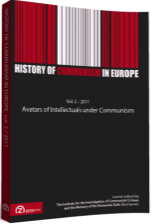Reassessing the Communist utopia? Eurocommunists at the mirror of „developed socialism”
Reassessing the Communist utopia? Eurocommunists at the mirror of „developed socialism”
Author(s): Valentine LomelliniSubject(s): History
Published by: Zeta Books
Keywords: PCI; PCF; developed socialism; politics of memory; Eurocommunism; Italy; France
Summary/Abstract: This article tries to provide some food for thought on the identities of the PCI and the PCF about the developed socialism, taking into consideration some relevant turning points in the ‘70s and three different case studies (the USSR, Czechoslovakia and Poland). Although it does not offer a complete analysis of Western Communist thinking on the image of developed socialism, it rather tries to reassess the common interpretation of some central features of the legacy of the developed socialism with respect to the two main Communist Parties of the Western bloc. Firstly, it argues that though many factors lay behind the strong tie between Western Communism and the Eastern communist states, the belief that developed socialism was reformable, mattered a great deal and, indeed, many leaders endorsed such a conviction. The Western leaders, and especially those of the Italian Communist Party, were arguably aware of the failures of developed socialism: particularly during the mid-‘70s, pessimism grew and was decisive in the creation of Eurocommunism. Nevertheless, the important role played by the Soviet Union in détente, and the conviction that the contradictions of the developed socialism could be resolved if the new course of the 20th Congress were restored, proved central in deining the image of developed socialism for Western Communists. Secondarily, the paper argues that historiography makes much of the dif er- ences between the PCI and the PCF: the first is usually considered more open, more democratic and capable of serious and genuine ideological evolution; while the latter is seen as a pro-Soviet Party, which used Eurocommunism as a tactic, and that lacked the capacity for autonomous thought. Though substantially agreeing on this distinction, more information is needed. We should stress that the thoughts of both Parties were based on the idea that a new political ruling class would have been able to change developed socialism. It would have brought about a new course, combining socialism and democracy or, at least, solving the contradictions within real socialism. Leadership was considered to be the key to changing the system. New Eastern heads and maybe also the Eurocommunist leadership would have been able to transform the system and set out a new path to socialism. The paper is based on archival resources recently made available, those of the Archivio Centrale del Partito Comunista Italiano – Fondazione Gramsci and of the Archive du Parti Communiste Français de la Seine-Saint Denis. Particular attention is given to press sources and interviews with former communist leaders.
Journal: History of Communism in Europe
- Issue Year: 2011
- Issue No: 2
- Page Range: 29-50
- Page Count: 22
- Language: English
- Content File-PDF

